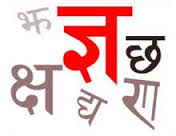In praise of Hindi
A neighbour has nicknamed Netra Miss Hindi. This was done because Netra insists on speaking Hindi with her friends. She is beginning to understand Bangla and can very well understand and converse in English yet she chooses Hindi to communicate. Its only when forced to use English, she prattles in the said language.
Teaching English is mandatory. We do understand why that is today but we do not know who made it that way. Speaking with your kids in English to familiarise them with the language is great and all but Hindi, our own language, our mother tongue should hold a place of pride, first in our eyes and head.
Hindi is sweet. Hindi is more effective in terms of giving you the exact word for any emotion, moment or feeling than any other language maybe. Hindi is vast. And while we are talking about children, Hindi is far more easier to learn than is English with its confusing phonetics. Though I admit that English wins hands down in being an adapting language that has not shied away from accepting words from various other languages and making them its own. It boasts of a number of words that have been adopted from Hindi itself.
But Hindi has 'rasas'. Forty three per cent of our population understands and uses Hindi. It is the sixth largest-language in the world. There is a sing song quality that lends itself easily to Hindi. A vast literature bank that lends itself to four very prominent forms covering under them everything from beauty to bravery. What joy in introducing valour by reciting Khoob ladi mardaani wo to Jhaansi waali raani thi or inspiring the little ones to never ever give up by singing gently jab tak na manzil paa sakoon, mujhe a viraam hai, chalna mera kaam hai or introducing them to satpudaa ke ghane jungle, neend se unghte, an- mane jungle!
Hindi is not to be known, learnt or read because it will get you ahead in a rat race or help you perch higher in the job market but parents must encourage children to learn Hindi and love it to be able to take pride in their rich cultural heritage, to appreciate beauty, to find joy in expressing their heart's desire in the exact way that it is being felt.
Teaching English is mandatory. We do understand why that is today but we do not know who made it that way. Speaking with your kids in English to familiarise them with the language is great and all but Hindi, our own language, our mother tongue should hold a place of pride, first in our eyes and head.
Hindi is sweet. Hindi is more effective in terms of giving you the exact word for any emotion, moment or feeling than any other language maybe. Hindi is vast. And while we are talking about children, Hindi is far more easier to learn than is English with its confusing phonetics. Though I admit that English wins hands down in being an adapting language that has not shied away from accepting words from various other languages and making them its own. It boasts of a number of words that have been adopted from Hindi itself.
But Hindi has 'rasas'. Forty three per cent of our population understands and uses Hindi. It is the sixth largest-language in the world. There is a sing song quality that lends itself easily to Hindi. A vast literature bank that lends itself to four very prominent forms covering under them everything from beauty to bravery. What joy in introducing valour by reciting Khoob ladi mardaani wo to Jhaansi waali raani thi or inspiring the little ones to never ever give up by singing gently jab tak na manzil paa sakoon, mujhe a viraam hai, chalna mera kaam hai or introducing them to satpudaa ke ghane jungle, neend se unghte, an- mane jungle!
Hindi is not to be known, learnt or read because it will get you ahead in a rat race or help you perch higher in the job market but parents must encourage children to learn Hindi and love it to be able to take pride in their rich cultural heritage, to appreciate beauty, to find joy in expressing their heart's desire in the exact way that it is being felt.




Comments